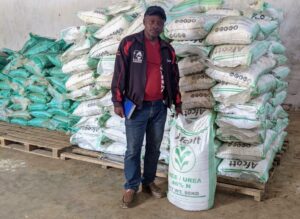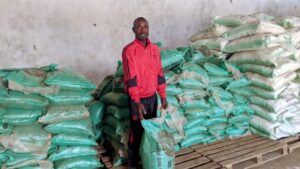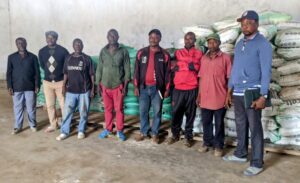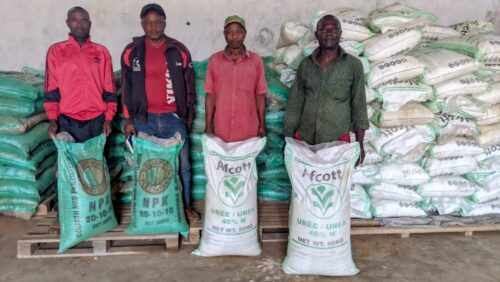Farmers in Bangem Sub Division have started receiving bags of fertilizers to boost food and cash crop production for 2024.
The 500 bags of fertilizer were made available to farmers on February 12, 2024 through the plantain value chain project championed by Rural Youths Leadership and Sustainable Development, RUYOLSUDEV to Bangem Farmers’ Cooperative, BAFCOOP.

While handing the bags of fertilizer to farmers, the Director of RUYOLSEDEV who doubles as President of BAFCOOP, Henry Nzuobontane disclosed that the donation is in the context of modernization and digitization of agriculture in Kupe Muanenguba.
He said through RUYOLSUDEV and BAFCOOP, they lobbied a company which shortlisted inputs for Bangem farmers at subsidized rates. He said they have created partnerships with other institutions to continuously help farmers in Bangem improve their yields.

“The first consignment of 500 bags of fertilizer is being distributed to farmers. We are expecting more and other inputs in the days ahead. In line with digitization with our partner bank, we have created bank accounts to farmers. This will help them have credit facilities to expand production with a multiplier effect to improve their standard of living.” Nzuobontane added.
He advised all farmers in Bangem Sub Division to join BAFCOOP to benefit from inputs at affordable prices far below the market price.
In reaction, farmers have expressed gratitude to the cooperative president and director for fighting to improve their well being.

Essambe Charles disclosed that to him a farm is like a woman who puts to birth and needs to be nourished to ensure that it regains its form. “I will use this fertilizer to nourish my coffee farm. Farming without inputs is merely waste of time. I sincerely thank RUYOLSUDEV and BAFCOOP for improving the status of farmers through this donation.” Essambe added.
Another farmer, Ndah Ekukolle attested that he has been benefiting from this initiative for the past three years. He thanked the donors for making it possible for them to have inputs. According to the farmer, it will go a long way to reduce cost of production, fertilize the soil and boost harvest in 2024.
By Glovise Forsoh




